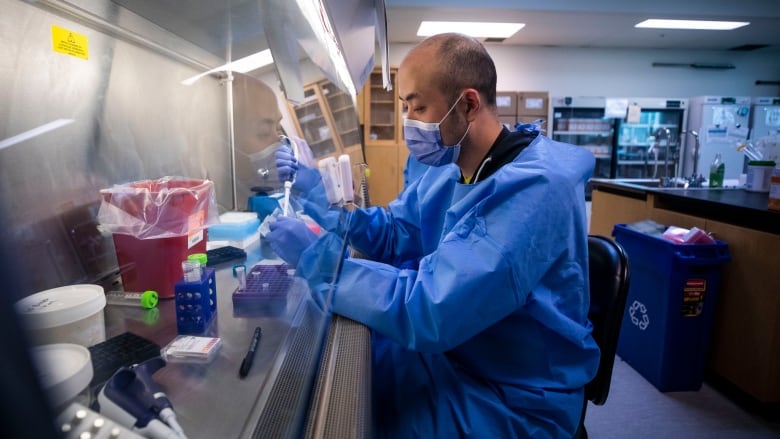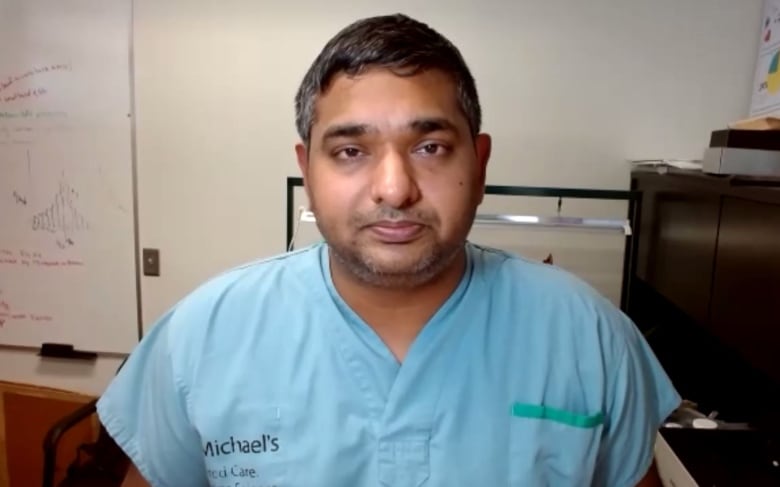A new Omicron variant is hitting the U.S. One expert expects Windsor to see an impact
Subvariant known as XBB.1.5 and has already hit the U.S. hard

A new variant of COVID-19 is gaining ground in the United States, andone expert says Windsor, Ont., could see an impact.
According to the Centers for Disease Control and Prevention (CDC), 40 per cent of COVID-19 cases in the U.S.arebeing caused by the new Omicron subvariant, known as XBB.1.5.
"It's part of the long line of variants that are emerging from the Omicron wave that really exploded at the beginning of last year," said Dr. Fahad Razak, the former director of Ontario's COVID-19 Science Advisory Table.
"XBB.1.5 is the latest. The reason people are paying attention to it is it seems to be expanding and it's in how common it is in the United States."
Information about the new subvariant is limited, with Razak saying that itsinfectiousnessis unknown and that there is nothing to suggest that it presents more of a risk in terms of severity.
Spike in Michigan could lead to spike in Windsor
Five Michigan countiesare seeing highCOVID levels, according to CDC data, while Wayne County, which includes Detroit, is at amedium level.
Razak said that as a border city, Windsor tends to get the first wave of what is happening in the U.S.
"This is another example where you would expect, statistically, that there's going to be more of these cases in Windsor flooding over from the United States than other parts of Canada," he said.
According to data from the Public Health Agency of Canada (PHAC), only 0.6 per cent ofcases across the country were caused by XBB.1.5 for the week of Dec. 11, 2022. PHAC says identifying the specific subvariant that causes each case takes one to three weeks.

The subvariant hasn't yet been identifiedinOntario through the province'sCOVID-19 genomic surveillance programas of the most recent report, which is based on data up toDec. 10, 2022.
The new subvariant is becoming more prevalent as Canada joined the list of countries that are temporarily requiring travellers from mainland China, Hong Kong or Macau to present a negative COVID-19 test before departure.
PHAC says the measure is in response to a surge of COVID cases in China as that country's strict "zero-COVID" policy was scrapped and the limited availability of epidemiological and other data related to it.
Despite the move by Ottawa, Razak said that medical professionals, including himself, have opposed it.
"We tried various ways during the pandemic to put in travel restrictions," he said. "When the Omicron wave emerged early last year, tough restrictions were put on all southern African countries in terms of travel and what we ended up seeing was in fact the variant was circulating in Europe weeks before it was first detected in South Africa. In this globalized world, I think the idea that you can shut down these borders and really keep a virus out is just not tenable and not based on science."

Razak said the policy raises another potential issue, saying that itcould beviewed as discriminatory.
"There's no talk about shutting down or enhancing screening for people from the United States," he said. "When you see a policy like this, which is levied at one Asian country, you worry that it looks a bit xenophobic and it's not based on science."












_(720p).jpg)


 OFFICIAL HD MUSIC VIDEO.jpg)
.jpg)



























































































